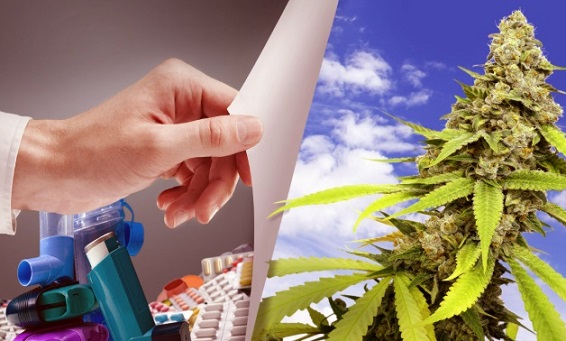Nikhil Prasad Fact checked by:Thailand Medical News Team Apr 03, 2025 3 weeks, 1 day, 5 hours, 47 minutes ago
Cannabis News: Cannabinoids and Asthma a Complicated Yet Hopeful Connection
A new review led by Polish scientists from the 10th Military Clinical Hospital with Polyclinic in Bydgoszcz, the Bydgoszcz University of Science and Technology, the Oncology Center of Professor Franciszek Łukaszczyk, and the Collegium Medicum at Nicolaus Copernicus University in Toruń explores whether cannabis-derived compounds such as cannabinoids - could serve as viable treatments for asthma.
 Cannabinoids Could Be the Future of Asthma Therapy but Only if Used Properly
Cannabinoids Could Be the Future of Asthma Therapy but Only if Used Properly
This complex inflammatory disease affects over 300 million people globally and comes in various forms, including allergic (type 2) and non-allergic (non-type 2) subtypes. Standard treatments such as inhaled corticosteroids and biologics work well for some but not all patients, especially those with severe or non-type 2 asthma. For this reason, researchers are now turning their attention to the endocannabinoid system - a widespread biological system in the human body - to explore new possibilities.
According to the study covered in this
Thailand Cannabis News report, the endocannabinoid system is made up of receptors (CB1 and CB2) with naturally occurring compounds like anandamide, and enzymes responsible for their breakdown.
Cannabinoids from cannabis - especially THC and CBD - interact with this endocannabinoid system, showing a range of effects, from muscle relaxation and bronchodilation to immune modulation. Animal studies suggest that these cannabinoids may reduce airway inflammation, curb hyperresponsiveness, and possibly even reverse some symptoms of asthma.
What the Research Shows About Cannabinoids in Asthma
In allergic asthma, the activation of the CB2 receptor may have both beneficial and harmful outcomes depending on context. Some studies show that activating CB2 increases inflammation by stimulating eosinophil activity and worsening airway hyperreactivity. Conversely, other experiments found that CB2 activation reduced inflammatory cytokines and improved symptoms when used with specific synthetic cannabinoids like β-caryophyllene or P6023.
In contrast, CBD - a non-psychoactive compound - has shown consistent anti-inflammatory benefits across various studies. In animal models, it helped decrease airway hyperreactivity, inflammation, collagen buildup in the lungs, and lowered levels of immune-signaling molecules like IL-4, IL-5, and TNF-α. In addition, it reduced IgE levels and stopped immune cells from differentiating into inflammation-promoting types. THC also demonstrated bronchodilator and antitussive effects in some experiments but was associated with conflicting outcomes depending on the mode of delivery and dosage.
Furthermore, CBD and THC seem to influence the balance between immune-regulatory and inflammatory cells - such as increasing the ratio of regulatory T cells (Tregs) to pro-inflammatory Th17 cells - thus reducing the overall immune overactivation seen in certain asthma types. Both compounds have potential in treating type 2 and non-typ
e 2 asthma, which is a major advantage since non-type 2 asthma currently lacks effective biologics.
The Dark Side of Cannabis Use
Despite its potential, recreational cannabis use is not without dangers - especially when smoked. Studies have found that cannabis smokers have a 31% higher risk of developing asthma and often suffer from worsened respiratory symptoms. This is due to toxic combustion byproducts like tar and ammonia, which can irritate lung tissue. In one study, cannabis-smoking asthma patients were more likely to require mechanical ventilation and had higher mortality rates.
Vaporization offers a safer alternative by heating cannabinoids to avoid combustion. Still, many users stick to smoking, sometimes believing it to be cheaper. Oral preparations like oils or capsules could be even safer, avoiding lung exposure entirely and providing more controlled dosages. However, education on safe cannabis use remains poor among both patients and healthcare providers.
Conclusions
While the existing animal studies provide promising insights, we are still far from using cannabinoids as standard asthma therapy in clinical settings. The effects of CB1 and CB2 receptors can vary greatly, depending on the type of cannabinoid, dosage, and disease phenotype. Recreational cannabis smoking is clearly harmful, especially in people with asthma, and should not be confused with medical use.
However, properly formulated CBD or THC preparations administered via safe routes - such as vaporization or oral capsules or nano-encapsulated drops, might one day become effective adjunct treatments. Further research, particularly human clinical trials, is urgently needed to assess long-term safety, efficacy, and optimal dosing. Until then, cannabinoids remain a potentially revolutionary but still experimental option for asthma therapy.
The study findings were published in the peer reviewed International Journal of Molecular Sciences.
https://www.mdpi.com/1422-0067/26/7/3328
For the latest
Cannabis News, keep on logging to Thailand Medical News.
Read Also:
https://www.thailandmedical.news/news/unlocking-the-potential-of-the-cannabis-entourage-effect
https://www.thailandmedical.news/news/forget-about-tetrahydrocannabinol-thc-and-cannabidiol-cbd-modern-medicine-more-interested-in-cannabigerol-cbg
https://www.thailandmedical.news/news/cannabichromene-an-unexplored-phytochemical-from-cannabis-with-a-huge-potential-as-a-game-changer-in-medicine
https://www.thailandmedical.news/news/cannabichromevarin-cbcv-a-hidden-gem-in-medical-cannabis-research
https://www.thailandmedical.news/news/cannflavins-the-rich-bio-therapeutic-flavonoids-from-the-cannabis-plant
https://www.thailandmedical.news/articles/cannabis
https://www.thailandmedical.news/pages/thailand_doctors_listings
